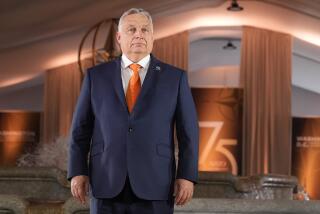Albright Blisters Balkan Leaders
- Share via
ZAGREB, Croatia — In some of the toughest public language from an American secretary of State in recent years, Madeleine Albright on Saturday warned the Balkans’ two major power brokers to give their full support to the U.S.-backed Bosnian peace accords or face punitive measures.
Although the blunt words delivered to Croatian President Franjo Tudjman and Serbian President Slobodan Milosevic in separate meetings brought few immediate results, U.S. officials stressed that it was the message and the way it was delivered that counted.
“They have been in denial over what our policies are,” one senior U.S. official said. “There’s no denial now. She spoke in the language of the region.”
Albright’s diplomatic bombing raid had one goal: to jolt new life into sputtering efforts to rebuild the region’s political stability and multicultural social fabric. Her demands included the turnover of indicted war crimes suspects for trial at an international tribunal at The Hague and the return of minority refugees to their homes in both Croatia and Bosnia-Herzegovina.
Her performance was the clearest demonstration yet that if the substance of U.S. foreign policy has remained largely unchanged in Clinton’s second term, its style has altered radically.
In her four-plus months on the job, Albright has used measured reason in Moscow to coax her reluctant Russian counterpart to accept a formal relationship with the North Atlantic Treaty Organization, then outright charm in Paris to repair damaged ties with French Foreign Minister Herve de Charette.
But Saturday, on her first trip to the Balkans, she checked charm and subtlety at the door.
In a day of confrontations that began with Tudjman here in the Croatian capital and culminated in a meeting with Milosevic in Belgrade, she moved from one tongue-lashing to another.
At one point, she gave Croatian Reconstruction Minister Jure Radic a dressing down for his country’s paltry record on resettling minority Croatian Serb refugees in the wake of the Balkan warfare.
“You should be ashamed,” Albright told him.
Although most of her haranguing of Milosevic--a onetime patron of the Bosnian Serbs--came behind closed doors, he too took a roasting, according to Albright herself.
How Albright delivered her message is likely to be remembered by those on the receiving end far longer than the message itself.
Consider the following events:
Scene I. The Presidential Palace in Zagreb. Albright stands before assembled reporters, one elbow propped on the podium, listening to Tudjman defend his country’s efforts to resettle minority Serb refugees. Her look is that of a college professor listening to a D-minus student deliver exactly what she expected: a D-minus performance.
In an earlier 1 1/2-hour meeting with Tudjman, she had warned the Croatian leader to work harder to resettle Croatian Serbs and cooperate with The Hague tribunal or face punitive action, including a U.S. veto of International Monetary Fund and World Bank loans; barriers to Croatia’s aspirations to join a more integrated Europe; and a delay in the return of the rich Eastern Slavonia region, an area seized by Serbia in 1991 and currently under U.N. control.
According to U.S. officials, Tudjman had responded with a 45-minute monologue.
Scene II. The village of Prevrsac in Croatia’s Kostajnica region--inhabited mainly by minority Serbs before war swept through the region in 1991, but predominantly Croat since Croatian forces recaptured the area in 1995. Albright stands in front of the charred remains of a home gutted by a Croatian mob, she is told by a U.N. official, because a Serbian family had tried to reclaim it.
“It’s the responsibility of your government to live up to its commitments,” she says, turning to Radic, who accompanied her on the trip. “It would be useful if some people here were arrested for this action.”
Her comments are a more controlled version of an emotional encounter, witnessed by a lone reporter, with Radic only minutes earlier in another village. The exchange came after Albright met with two ethnically mixed couples, one Serb-Muslim, one Serb-Croat, also burned out of their homes by Croatian toughs. Turning to Radic, she asked:
“How can you let this kind of thing happen? These poor people did nothing wrong. I’ll tell you something, it’s worse that than that. The government at the top thinks things like this are normal. They are not normal. You should be ashamed.”
Radic, towering over Albright, replied only that Croatia’s official policy does not condone atrocities. Only later, on government radio, did he return fire, saying, “Croatia is not a colony of the United States.”
Scene III. The Presidential Palace in Belgrade, the Serbian and Yugoslav capital. Albright sits down with Serbian President Milosevic for a combative meeting.
She presents new evidence against three indicted war crimes suspects known to live in Serbia. At one point during the meeting, when Milosevic tells her she is misinformed, she reportedly responds: “Don’t give me that. I’m from this region; I’m not naive.”
Afterward, she told reporters: “I made clear to him that Serbia is at a crossroads. I told him Serbia could either comply with the [Bosnian] accords, cooperate with the war crimes tribunal . . . and support democratization . . . or keep stonewalling and assure its isolation. I’m sure President Milosevic had no doubt about my message.”
More to Read
Get the L.A. Times Politics newsletter
Deeply reported insights into legislation, politics and policy from Sacramento, Washington and beyond. In your inbox twice per week.
You may occasionally receive promotional content from the Los Angeles Times.










